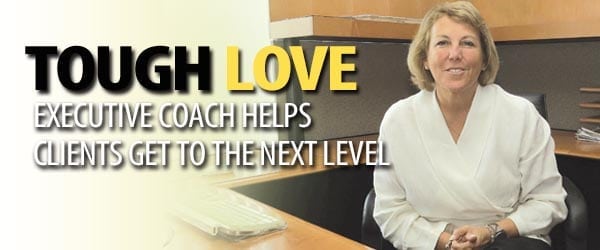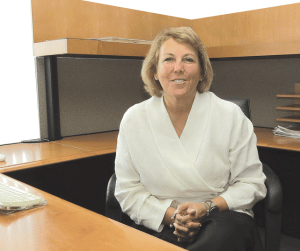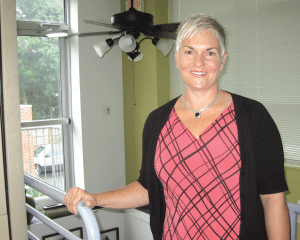
Tough Love
Executive Coach Helps Clients Get to the Next Level

Anne Weiss says that, while she sometimes helps clients affect change, more often, she is engaged in “tweaking” their habits and thought processes.
“She thinks really, really big,” recalled Jamrog, a wealth-management adviser and principal with the Jamrog Group, affiliated with Northwestern Mutual, adding that her career in financial services was then about five years old and at what could only be described as a crossroads, which is why colleagues had referred her to an executive coach and, specifically, Weiss.
“If you mention that someday, one day, you hope to accomplish ‘X,’ she’ll want to get that done in the first year,” said Jamrog while elaborating on what she found scary about her new coach. “And that’s what we did; I told her my three-year vision for my practice, and she said, ‘why don’t we do that in 12 months?’
“She’s synonymous with ‘tough love’ — if you say this is what you want to accomplish, she will not let up in seeing that you do,” Jamrog went on, adding that, overall, what Weiss helped her find professionally were consistency, accountability, and a calendar that consistently generated a proper work/life balance as her circumstances changed.
And because she’s been able to do that for a number of clients, she’s considered one of the most successful executive coaches in this area.
Over the years, she’s grown her client portfolio to include bank presidents, lawyers, accountants, architects, executives with large corporations, owners of small businesses, and even some business consultants.
They all have specific needs, and all were at some kind of proverbial crossroads when they decided to seek out her services, said Weiss, but there is a simple and basic pattern to the client-coach relationship, one that she has mastered to the point where she now counts nearly 20 clients from both inside this region and well outside it.
“It starts with both parties being clear about the result that they want to be accomplished,” she said, “and then creating a plan to have that goal accomplished, and then holding people to account for accomplishing it.”
Sometimes, this accountability process requires a phone call a week, other times one lengthy meeting each month, she went on, adding that, in general, having a coach makes them more effective, gives them peace of mind, or both.
She said her coaching role, which is a huge part of her consulting practice, involves working with clients on any number of issues or challenges, from teaching them how to network (a critical skill when it comes to building a business) to advising them on setting and reaching goals, to enabling busy professionals to effectively learn how to say ‘no’ to some of those requests for their invaluable time.
“A lot of times, I don’t have the answer,” she said as she said as she talked about her work. “But in talking with the client, we come up with something that would be an answer, and then we say, ‘this is good — let’s go for it.’”
Overall, Weiss said, while she sometimes brings about real change in people, more often she is “tweaking” their style when it comes to everything from how they interact with people to how they manage time to how to become more punctual.
“Sometimes people need to change, and other times people need to be tweaked, but even tweaking can often make a profound difference,” she said, referring to both an individual’s career and a company’s bottom line.
For this issue and its focus on business management, BusinessWest talked at length with Weiss about executive coaching and how she uses that tough love Jamrog described to help get through the crossroads and into the fast lane when it comes to personal and professional growth.
Getting Down to Business

Amy Jamrog says Anne Weiss helped her with many aspects of career and business development, the most significant being the ability to work consistently.
What might be considered new, she went on, is a realization among a growing number of business owners and managers that, while they may know their industry and vocation, they don’t know everything about succeeding professionally.
And this is why her client list has grown steadily over the years, with the notable exception of the peak years of the Great Recession, when many executives decided that, despite apparent need, they felt they just couldn’t afford a coach during those lean times.
The portfolio is now larger than it was prior to the crash of 2008, said Weiss, adding that this is both a good barometer when it comes to the economy and an indication that a growing number of professionals are becoming comfortable with the concept of hiring a coach.
When asked how someone will know when they’re ready for that step, she said simply, “when you need to produce something you can’t produce on your own.”
And in the business world today, that’s most people, she went on, adding that a coach can provide such individuals with a unique, outside perspective not available from a mentor, per se, or from someone inside a company or organization.
“I’m not their advisory board, and I’m not their board of directors,” she explained. “So there’s a level of accountability and understanding, so they’re free to be able to say, ‘here’s what’s working, and here’s what’s not working.’”
Weiss brings a broad range of experience to her role as coach. Earlier in her career, she worked in sales and marketing, and eventually segued into consulting, with a heavy emphasis on executive coaching. In the mid-’90s, she partnered with two others in a venture called TLD Consulting, which was based in New York, but has been on her own for the past 16 years.
Most all of her business comes from referrals, she noted, adding that she works with individuals in a wide array of sectors, including financial services, education, and manufacturing, and has assisted a number of entrepreneurs as they have struggled to take ventures to the next level or juggle several initiatives simultaneously.
As she elaborated on what she does and how she does it, Weiss came back repeatedly to the phrase “holding people accountable” for meeting or surpassing the goals they have set for themselves.
And she does so with a passion that that prompted Jamrog to summon not only that word ‘scary’ but also ‘intimidating,’ and another business owner to note in an online testimonial that she has “ruthless compassion,” which sounds like a synonym for tough love.
“She asks really hard questions and then waits for you to figure out the answer,” said Jamrog, adding that, shortly after becoming a client, she developed a strong desire not to disappoint the coach.
“When I had to be accountable to her, and pay her, that became a real motivator for me — when I told her I was going to do something, I didn’t want to let her down,” she said. “And that made it an interesting relationship, different from anything I’d had before. She wasn’t my boss, she wasn’t my mom, she wasn’t even a colleague, but I wanted to do what I said I was going to do, because she was counting on me. The coaching relationship is very interesting like that.”
Accounting Lessons
When asked what problem, or professional weakness, Weiss was most helpful with, Jamrog said it was consistency in her work.
“I would work really hard, then I wouldn’t, then I’d work really hard again, and then I wouldn’t,” she explained. “It was a very inconsistent — and also very stressful — way to work. She helped me really build in consistent practices that became habits over time.”
But that proved to be simply one of many ‘projects’ the two would work on over a coaching relationship that would last eight years and ended only because Jamrog had reached a point professionally where she was comfortable and simply didn’t want to take on any more projects.
Weiss said her clients have different motivations for seeking out her services. Many, like Jamrog, had reached a point in their career where they realized that to get to the next level — whatever that might be — they would need some help getting there. Others, meanwhile, don’t feel accomplished in their career, despite a decent level of success, and need help reaching that station. And still others understand that, while they may be good at what they do professionally, they need a coach to help them to maximize their potential, set the bar higher, and then clear the bar.
Sometimes clients simply need some help with those people skills that are often as important as technical ability when it comes to growing a book of business.
“It’s not the same dynamic anymore,” she said of business in general. “What used to be a handshake now requires a contract, and what used to be an old-boys kind of network isn’t like that anymore. Being in business requires a lot more networking, and one of the trends I’ve seen is that people need to be trained in how to network, in how to grow their business.
“Lawyers went to school to practice law; they didn’t know that they were going to have to be accountable for going out and growing their business,” she continued. “Architects thought their job was just to draw and build. Instead, they need to be the ones on the street meeting with facility managers and learning that there’s a new job at Smith College, and that company should get it.”
Beyond these hard lessons and the broad assignments of holding clients accountable for their stated goals for themselves or their company, Weiss said she also helps with that ‘tweaking’ she described earlier, noting that, quite often, seemingly small changes in style and performance can bring about significant impact in both the efficiency of an operation and how a leader is perceived by employees, customers, and the business community in general.
“If someone alters some way that they act — they’re on time, they answer e-mails, they return phone calls — those little things will matter in how people interface with that individual and how they respond to that person,” she said. “If you show up to a meeting with an agenda, start it on time, and end it on time, there’s a respect that people will have for you, and as you keep doing that, people will start to respond very positively.”
As an example of such tweaking, Weiss cited a local banking executive who was consistently late for appointments and, more importantly, not feeling accomplished professionally.
“So we took apart his entire job to find out why,” she explained. “And what we found is that he had said ‘yes’ to more requests to be on boards, to be on committees, to be on subcommittees to committees … it’s no wonder he couldn’t handle it all. He said ‘yes’ to way too many things, so we had to unravel and undo and revoke some of the things he had said ‘yes’ to and replace him on some of those boards and committees, while keeping him on in the things that mattered most to him.”
Coach Class
Weiss noted that, while her work can at times be frustrating — over the years, a few clients have eventually been deemed ‘uncoachable’ — it is usually quite rewarding.
That’s because people come to her when they realize that they need to produce something and can’t produce it on their own, she said, adding that helping them get there by asking the hard questions, working with them to find answers, and then holding them accountable for results is very fulfilling work.
This is the essence of tough love, or “ruthless compassion” in the business world, and Weiss has it down to a science.
George O’Brien can be reached at [email protected]






